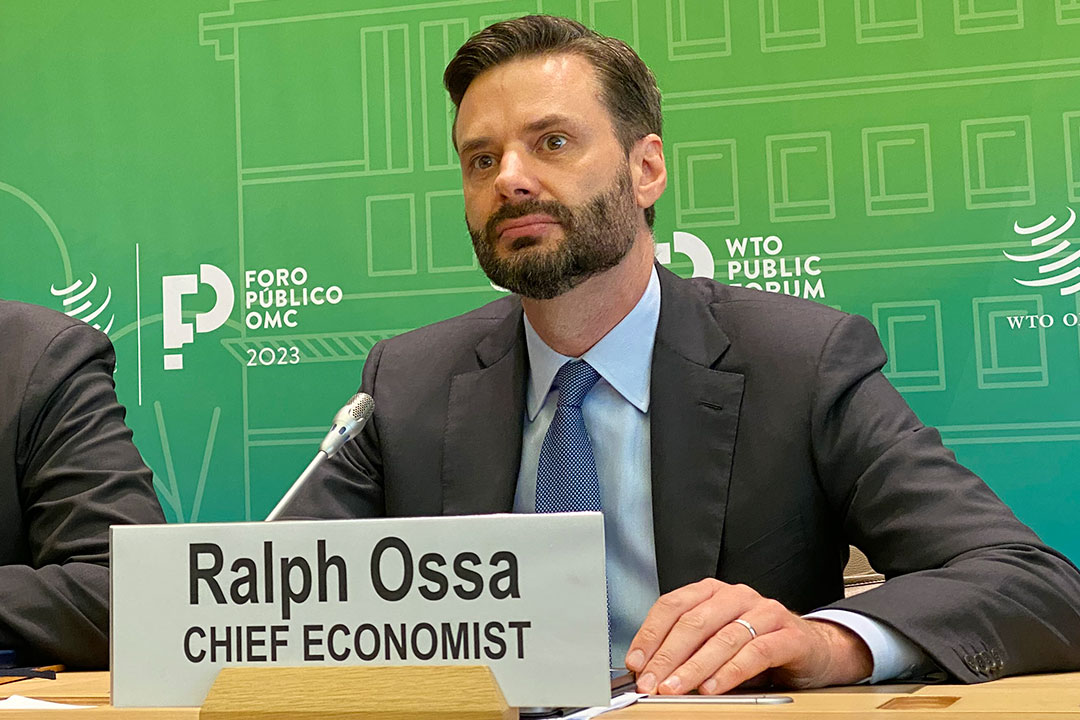WTO plans to fix Appellate Body paralysis by 2024

By Norman P. Aquino, Special Reports Editor
GENEVA — The World Trade Organization (WTO) is on track to fix its dispute settlement process by 2024, its chief economist said, amid criticisms that the global trade body is being stymied by its reliance on the consensus system.
“The WTO has resolved to fix this by 2024,” WTO Chief Economist Ralph Ossa told reporters at the launch of the WTO Global Trade Report in Geneva on Tuesday.
Ensuring that the 164-member trade organization has a fully functional dispute settlement system by next year is a “high priority,” he added, without providing more details.
The global economy is said to be edging closer to survival-of-the-fittest mode as major economies skirt the post-World War II trading system in favor of a more restrictive and transactional approach to world commerce.
US President Joseph R. Biden, Jr. has kept his predecessor’s tariffs on steel, aluminum and about $200 billion worth of Chinese imports, all illegal under the WTO rules.
He has also kept the paralysis of the seven-member WTO Appellate Body, which stopped functioning in December 2019 after the US blocked the appointment of new members, citing “judicial overreach” among other issues.
This has led to most panel reports being appealed into the void and leaving the disputes unresolved. As a result, members can’t enforce WTO obligations through complaints against alleged trade violations.
The Philippines and Thailand did manage to settle their trade dispute over Manila’s cigarettes in June last year without the Appellate Body after more than a decade of litigation.
Globalization — and WTO — critics have said the WTO’s consensus system needs to be replaced by a new negotiating model that meets 21st century problems including climate change, environmental destruction, low labor standards, human rights and corruption. They are also calling for bilateral and plurilateral deals to level the playing field.
Ministers in June committed to work toward reforming the organization to improve its functions through an open, transparent and inclusive process. The WTO’s General Council and its subsidiary bodies will conduct the work, review progress and consider decisions on reform to be submitted to the 13th Ministerial Conference in Abu Dhabi in February.
The Ministerial Conference is the topmost decision-making body of the WTO.
Ministers also committed to discuss and address challenges and concerns about the WTO’s dispute settlement system.
The WTO on Tuesday said geopolitical tensions and recent crises have spurred protectionist policies that are slowly eroding the world’s trading system and could ultimately fragment the global economy.
In its annual Global Trade Report, it called for “re-globalization” — a renewed drive toward a broader and more inclusive integration to more economies, people and issues.
The WTO is being hindered by its reliance on the consensus system and getting 164 members to agree on anything is a tall order, said Arthur E. Appleton, a partner at Appleton Luff — International Lawyers and adjunct professor at the Johns Hopkins University School of Advanced International Studies.
It was also hampered by a nonfunctioning Appellate Body, he said in an e-mail, adding that without an effective dispute settlement system, it is more difficult to apply the rule of law when international trade disputes arise.
WTO member countries would probably consider additional plurilateral agreements to avoid the blockages caused by the consensus system, and they need to resolve the dispute settlement impasse, he added.
Meanwhile, smaller and developing economies like the Philippines will be the most at risk from global trade fragmentation because they depend a lot on imports, World Trade Report coordinator Victor Stolzenburg told reporters at the launch of the WTO’s flagship report in Geneva.
Gains made in alleviating poverty, raising income and improving living standards in these economies could get lost if protectionist policies are allowed to continue, he added.
He also said the Philippines must address structural issues including in agriculture to maximize the gains from global free trade.
“Trade can only do so much if the domestic policy environment is not in place,” he said.
GLOBALIZATION BACKBONE
Mr. Appleton said international trade is vital to the continued development of the Philippines.
“Some argue that every manufacturing job produces three service scooter jobs — this means very good employment prospects for Philippine workers,” he said.
The Philippines needs globalization to continue the development of its goods sector and service sector, which has increasingly become more important.
“The rule-based trading system which is the backbone of globalization, provides security to the Philippine business community and for Philippine economic development,” he said.
The Philippine government should continue to boost education, infrastructure development and the rule of law, he added. “All three are important for attracting inward and foreign direct investment and the Philippines’ continued economic development.”
Mr. Appleton said China itself also depends a lot on access to foreign markets and raw materials. “In other words, China’s economic development is dependent upon access to global supply chains.”
“As a result, China also needs the rule-based system that the WTO and globalization offer. Since China is the Philippines’ most important trading partner, Philippine producers also benefit from the legal and economic security offered by the rule-based international trading system,” he added.
Mr. Ossa earlier said trade was remarkably resilient during the coronavirus pandemic, bouncing back to pre-pandemic levels less than a year after the first wave of lockdowns.
Trade in digitally delivered services remained strong all along, growing at an average annual rate of 8.1% between 2005 and 2022, outpacing goods (5.6%) and other services (4.2 %).
“But the warning signs must be taken seriously,” Mr. Ossa said. “In the report, we looked at trade within and between hypothetical geopolitical ‘blocs’ constructed based on voting patterns in the United Nations General Assembly.”
Goods trade flows between these “blocs” have grown by as much as 6% more slowly than within these ‘blocs’ since the onset of the war in Ukraine, indicating a shift toward friend-shoring, he said.
Mr. Ossa also cited an increasing level of trade concerns being raised about unilateral policies of trading partners in the WTO, while the International Monetary Fund has reported a fragmentation of investment flows.
“All of this will eventually be reflected in reduced trade growth unless countries re-embrace multilateralism or re-globalization,” he added.
The WTO’s next trade forecast will come out in early October, “and it will be interesting to see what direction trade has taken since the spring.”



